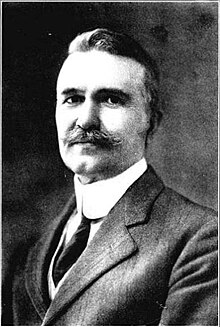
William Philip Spratling (October 13, 1863 – December 22, 1915) was an American neurologist known for his advances in the treatment and study of epilepsy; he is often described as the first American epileptologist – a word he is credited with having coined in his 1904 work Epilepsy and Its Treatment.
Biography
William P. Spratling was born in La Fayette, Alabama on October 13, 1863.
Dr. Spratling was the superintendent of the Craig Colony for Epileptics in Sonyea, New York from 1893 to 1908. He was co-founder and the first president of the National Association for the Study of Epilepsy. He was also the editor of the Proceedings of the Association between 1904 and 1912
In his book Epilepsy and its Treatment, published in 1904, he supported the theory of a cortical genesis of epileptic seizures earlier popularized by John Hughlings Jackson and William Richard Gowers, based on the animal studies of Gustav Fritsch, Eduard Hitzig, and David Ferrier.
In 1904, Spratling was appointed superintendent of Bellevue Hospital Center; however, due to civil service requirements, he did not actually hold the office.
From 1911 to 1912 Spratling was a member of the Editorial Board of the journal Epilepsia of the International League Against Epilepsy (ILAE).
Later in life, Spratling suffered a nervous breakdown and retired to Florida. On December 22, 1915, he died of a gunshot wound while hunting in Welaka, Florida.
Family
Spratling's son was silversmith William Spratling.
Works
- The Treatment of Epilepsy and Its Incipience, 1894
- An Ideal Colony for Epileptics, and the Necessity for the Broader Treatment of Epilepsy, 1901
- Epilepsy and Its Treatment, 1904
- Epilepsy and Its Relation to Crime
References
- Dasheiff, RM (1994). "The first American epileptologists: William P. Spratling, MD, and Rosewell Park, MD". Neurology. 44 (1): 171–4. doi:10.1212/wnl.44.1.171. PMID 8290059. S2CID 26468741.
- What is an Epileptologist?, at the University of Oklahoma College of Medicine Department of Neurology, 2011, via archive.org, archived July 23, 2011
- "New Head for Bellevue - Dr William P. Spratling Chosen by Board of Trustees" from The New York Times, May 14, 1904, retrieved May 7, 2011
- Fine, E.J.; Fine, D.L.; Sentz, L.; Soria, E.D. (1995). "Contributions of the founders of Craig Colony to epileptology and public care of epileptics: 1890–1915". Journal of the History of the Neurosciences. 4 (2): 77–100. doi:10.1080/09647049509525629. PMID 11619021.
- "New York State's Epileptic Colony – Interesting Village of Sonyea, Where Afflicted Are Cared For" from The New York Times, November 9, 1902, retrieved May 7, 2011
- Fine, EJ; Fine, DL; Sentz, L (1994). "The importance of Spratling". Arch Neurol. 51 (1): 82–6. doi:10.1001/archneur.1994.00540130116019. PMID 8274114.
- Spratling WP, ed. Transactions of the National Association for the Study of Epilepsy and the Care and Treatment of Epileptics at the Second and Third Annual Meetings held in New York City in November, 1902, and in Philadelphia, in November, 1903. Vol 2. Rochester, New York, Democrat & Chronicle Printing without year (1904)
- Spratling WP, ed. Transactions of the National Association for the Study of Epilepsy and the Care and Treatment of Epileptics. Tenth Annual Meeting St. Louis, MO, June 16, 1911. Vol 8. Mt. Morris, New York, Union Press 1912
- Spratling WP. Epilepsy and its Treatment. Philadelphia – New York – London, W. B. Saunders 1904
- Tangle at Bellevue Now - New Superintendent Must Take Examination, the Commission Rules. from the New York Times, June 16, 1904, retrieved May 7, 2011
- DR. WM. P SPRATLING DIES. Specialist on Nervous Diseases Succumbs in Florida. The New York Times, page 9, December 24, 1915.
- Reed, John Shelton (November–December 2000). "The Man from New Orleans". Oxford American. Archived from the original on July 2, 2005. Retrieved March 4, 2020.
- "Accidental Shot Robs U.S. of an Authority Medical Ass'n. Affairs". The Miami News. Palatka. December 29, 1915. p. 6. Retrieved March 4, 2020 – via Newspapers.com.
- William Spratling Biography at SpratlingSilver.com, by Phyllis Goddard, 2003; retrieved May 7, 2011